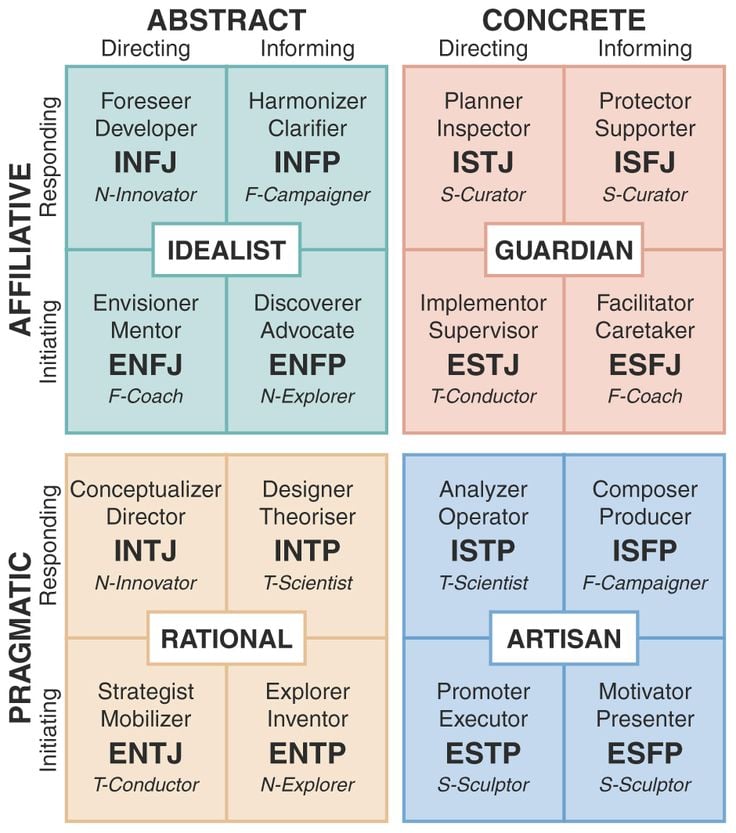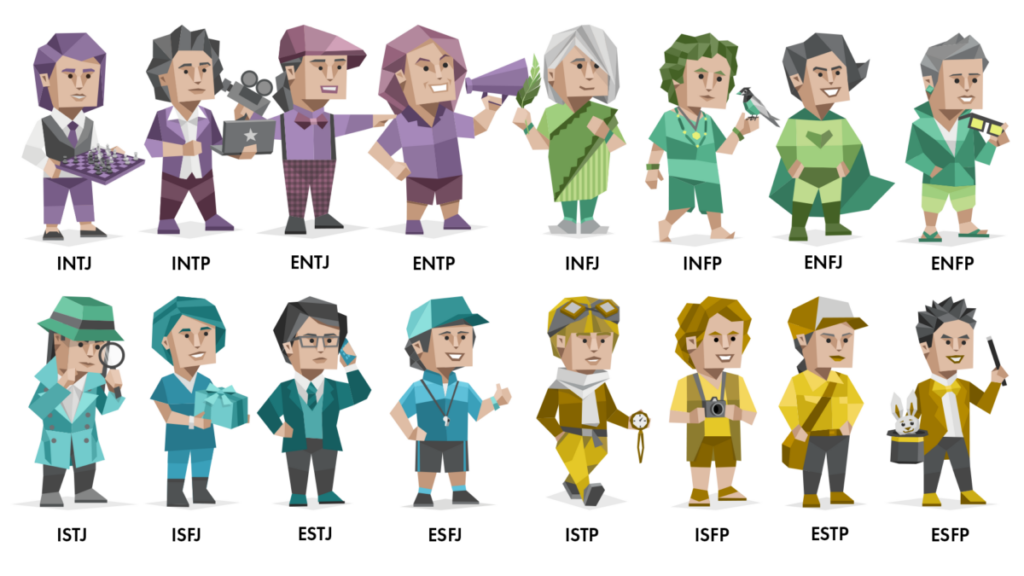Understanding yourself and others is the key to harmony in life. The Myers-Briggs System (MBTI) is a tool that helps reveal unique personality traits.
This method not only allows you to better understand yourself, but also provides valuable guidelines for communicating with others. By knowing your colleague’s or partner’s MBTI, you can tailor your communications to achieve mutual understanding and effective collaboration.
Don’t forget: MBTI is just one of many self-discovery tools. It does not define the complexity of human nature, but rather indicates directions for development and self-improvement.
Description of the four MBTI dichotomies and sixteen personality types
Colleagues, I welcome you to the world of MBTI – a tool that will open to you the secret room of the human psyche. Today we’ll dive into the four MBTI dichotomies and sixteen personality types. This journey promises to be exciting!
What is MBTI?
MBTI Dichotomies
Let’s look at the four main dimensions of personality:
- Extroversion (E) – Introversion (I): Extroverts get energy from communicating with the outside world, and introverts get energy from being alone with their thoughts.
- Sensory (S) – Intuition (N): Sensory types rely on what is felt here and now, while intuitive types are focused on the possibilities of the future.
- Thinking (T) – Feeling (F): “Thinkers” make decisions based on logical analysis, “feelers” rely on value judgments.
- Judgment (J) – Perception (P): Judicious people like order and structure, while receptive people prefer flexibility and spontaneity.
Sixteen personality types
From the combination of these dichotomies, 16 different types arise:
- ISTJ – Reliable Performer
- ISFJ – Caring Protector
- INFJ – Thoughtful Advisor
- INTJ – Strategic Thinker
- ISTP – Master of Genius
- ISFP – Sensitive Artist
- INFP – Idealistic Seeker
- INTP – Analytical Philosopher
- ESTP – Dynamic Entrepreneur
- ESFP – Freelance Artist
- ENFP – Inspirational Activist
- ENTP – Open-minded Innovator
- ESTJ – Management Card
- ESFJ – Community Harmonizer
- ENFJ – Visionary Teacher
- ENTJ – Determined Commander
Each of these types has its own unique combination of character traits, which makes it an inimitable personality.
Understanding your MBTI can be a starting point for developing both professional skills and behavioral strategies to achieve harmony in your life.
Step-by-step guide to self-identifying your personality type using MBTI
Dear readers, when was the last time you asked yourself the question: “Who am I?” Perhaps this happened not so long ago. Today we will dive into the world of self-discovery through the MBTI system – one of the most popular and respected personality analysis tools.

Step 1: MBTI Basics
First of all, let’s understand what MBTI is. This is an acronym for Myers-Briggs Type Indicator. The tool is based on Carl Jung’s theory of psychological types and divides people into 16 different personality types based on four criteria:
- Extroversion (E) or Introversion (I)
- Sensory (S) or Intuition (N)
- Thinking (T) or Feeling (F)
- Judgment (J) or Perception (P)
Step 2: Take the test
There are many online resources where you can take the MBTI test for free. Find a reliable site and devote about half an hour of your time to this process – this is the standard testing duration.
Step 3: Analyzing responses
After passing the test, you will receive a four-letter combination that will be your personality type. For example, INFP stands for Introverted Intuitive Feeling Perceptual Personality.
Step 4: Understanding your type
The resulting result is not just a set of letters. Each type has its own unique set of characteristics and preferences.
Step 5: Self-Acceptance
MBTI is not about changing you. It helps you understand your own strengths and areas for growth. Learn to be grateful for who you are.
Step 6: Using what you know about yourself
Knowing your personality type can help you make informed choices in your career, relationships, and life in general. You begin to understand other people and learn to communicate effectively with them.
Self-knowledge is the key to success in every aspect of life. Your MBTI personality type is not a label; it is a compass for navigating the complex social jungle of the world.
What does this mean for you
Understanding your type opens the door to informed choices in your profession and personal life. You begin to see not only your strengths, but also opportunities for growth.
Self-discovery through MBTI is not limiting, but liberating. This is a chance to be grateful for who you are and use this information to create a more harmonious existence both in your personal space and in personal relationships.










